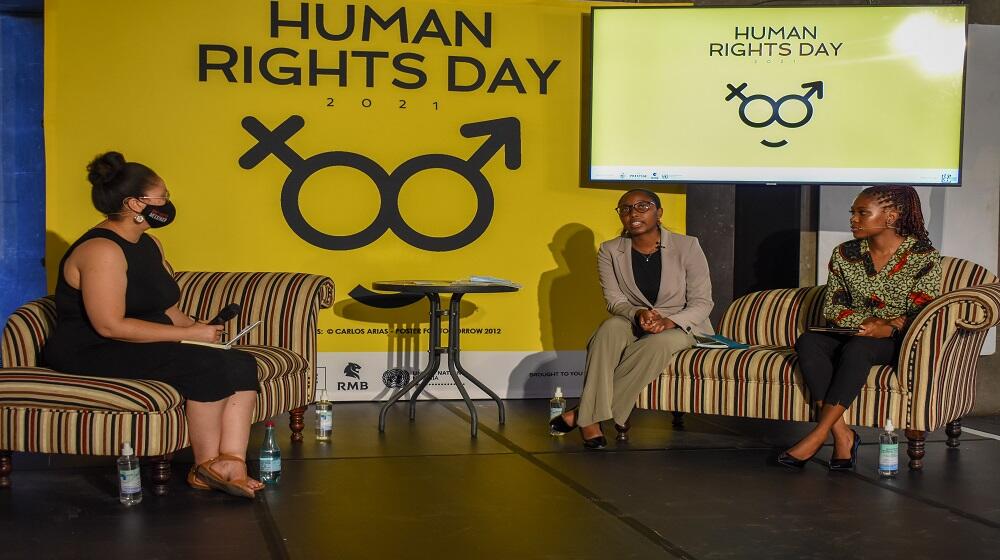WINDHOEK, Namibia – Human Rights Day took centre stage last week when Namibia joined the rest of the world to commemorate the day under the theme: “Equality – Reducing inequalities advancing human rights.”
Partners including the United Nations Namibia, the Franco-Namibia Cultural Centre(FNCC), the Rand Merchant Bank (RMB) Namibia, Café Prestige and the Government of Namibia showcased a two-day event at the FNCC drawing attention to “Equality” and article 1 of the Universal Declaration of Human Rights.
On 8 December, seasoned Namibian journalist, Ms. Jemima Beukes, hosted Wednesday evening’s panel discussions at the FNCC Gallery. The panel discussions covered a variety of topics. Including:
Women’s economic empowerment and the impact of Covid-19 on women’s Rights
Gender-based violence (GBV) and male engagement
Human rights and sexual reproduction health rights

The panelists comprised of government officials as well as experts and activists fromthe private and public sector. Throughout the discussions, panellists mentioned the systemic nature of GBV and the need to tackle this pertinent issue while considering the psychological, economic and social ramifications that it has on the young and old in our communities.
In her remarks at the opening ceremony, Advocate Dollien //Gowases from the Office of the Prosecutor General made it clear that GBV undermines the role that women play in society. “Without women, what would life look like? Would there be life? Or thriving nations and civilizations? It sounds and is impossible. And that’s the impact GBV has had on Namibia as a developing nation”, said //Gowases.
//Gowases also added that “while a patriarchal outlook may reduce and limit the role of the women to child birth, to kitchens and in positions of submission, the opposite is true. Women are also an essential, critical agent of social, cultural, economic and political development of any country.”
Several contributions also came from an audience, which constituted of members from the international community, government and activist groups and the public.
Throughout the first evening the audience was treated to several performances by Namibian artists such as Patrick Star, Emvee K and Alexandria.
On December 9, the partners officially opened two exhibitions that will be running until early 2022 at the FNCC. The first is a photographic exhibition chronicling the history of the Universal Declaration of Human Rights. Second, was a poster exhibition titled “Gender Equality Now!” by the United Nations Democracy Institute and curated by the FNCC team.
The poster exhibition showcased thought provoking artwork to spark conversations on Human Rights and Gender Equality.
RMB Namibia unveiled a replica of the “Fearless Thinker” statue. Commissioned by RMB and created by artist Marieke Prinsloo-Rowe it is an Afro-centric version of the “Fearless Girl” statue located in Wall Street, New York and speaks to values of individuality, courage and strength.
In his keynote address, Sen Pang, UN Resident Coordinator to Namibia, noted that in celebrating Human Rights Day, we must remind ourselves how the COVID-19 crisis has exacerbated the vulnerability of the least protected and most marginalized in our societies.
“The ongoing crisis associated with the pandemic has put human rights and other international legal protections under extra pressure. Bringing human rights home is at the core of the UN’s mission to integrate Human rights and make it a reality in the daily life of every single person in the world and to further integrate human rights into our socio-economic response to the crisis”.
The UN approach to achieving equality is set out in the document “Shared Framework on Leaving No One Behind: Equality and Non-Discrimination at the Heart of Sustainable Development”.
This includes addressing and finding solutions for deep-rooted forms of discrimination that have affected the most vulnerable people in society, including women and girls, indigenous peoples, people of African descent, LGBTI people, migrants and people with disabilities, among others. It ultimately aims to achieve equality in dignity and rights for all supporting opportunities and outcomes for fairer and inclusive societies.
Harry Rheeder, a renowned Namibian pianist, who has collaborated on the popular UN75 song, “Better Tomorrow”, alongside award-winning Namibian artists, rounded off the evening with charismatic piano concert.
Visually impaired Rheeder delighted the audience with his musical talent and advocacy ensuring inclusivity for people of all abilities to embrace their role to an equitable society for all.
Ends
Issued by:
The United Nations Information Centre (UNIC) Windhoek
For more information, please contact one of the following individuals:
Ms. Anthea Basson at bassona@un.org or +264 81 551 1695
Ms. Welda Mouton at mouton@un.org or +264 81 5511378


